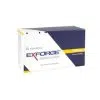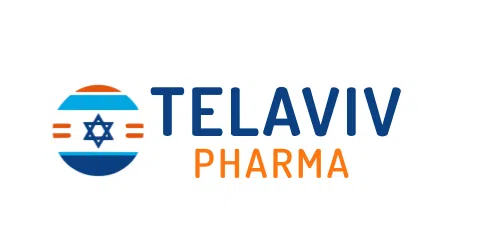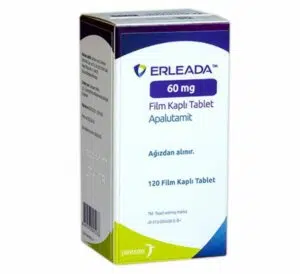No products in the cart.
Return To ShopErleada
Erleada (apalutamide) is an oral androgen receptor inhibitor used to treat hormone-sensitive metastatic prostate cancer and non-metastatic castration-resistant prostate cancer. This medication blocks androgen receptors that fuel prostate cancer growth, providing significant survival benefits when combined with hormone therapy. For patients seeking effective cancer treatment options, working with oncologists ensures proper monitoring and management, as Erleada requires careful medical supervision due to potential serious side effects including cardiovascular events, seizures, and falls, making specialized cancer care essential for safe and effective treatment outcomes.
- Prescription Required
| Brand | Form | Price | Qty | Action |
|---|---|---|---|---|
| Erleada Brand | 60mg 120 Tablets | $2,748.00 |
- Please note all prices are in US dollars
Erleada (Apalutamide) – Complete Product Information
Erleada (apalutamide) represents a significant advancement in prostate cancer treatment, functioning as a next-generation androgen receptor inhibitor that provides superior therapeutic outcomes compared to traditional hormone therapies. As a selective antagonist of androgen receptors, Erleada blocks the binding of androgens (male hormones) to their receptors, preventing the hormonal signals that drive prostate cancer cell growth and proliferation.
Prostate cancer cells depend heavily on androgen signaling for survival and growth, even in castration-resistant disease where traditional hormone therapy becomes less effective. Erleada works by competitively binding to androgen receptors with high affinity, blocking both testosterone and dihydrotestosterone (DHT) from activating these receptors. Additionally, the medication impairs nuclear translocation of androgen receptors and inhibits DNA binding, creating multiple barriers to androgen-driven cancer progression.
Clinical Applications and Proven Benefits: Erleada has demonstrated remarkable efficacy in two distinct prostate cancer populations. In hormone-sensitive metastatic prostate cancer (mHSPC), the medication significantly extends overall survival when combined with androgen deprivation therapy (ADT). For non-metastatic castration-resistant prostate cancer (nmCRPC), Erleada dramatically delays metastasis development and extends metastasis-free survival.
Clinical trials have shown that Erleada can reduce the risk of death by approximately 33% in metastatic hormone-sensitive disease and delay metastasis by over two years in non-metastatic castration-resistant disease. These benefits translate to meaningful improvements in quality of life, allowing patients to maintain normal activities longer while controlling their cancer progression.
Mechanism of Action and Superiority: Unlike older anti-androgen medications that may have partial agonist activity, Erleada functions as a pure antagonist with no agonistic properties. The medication binds directly to the ligand-binding domain of androgen receptors, preventing conformational changes necessary for receptor activation. This comprehensive blockade extends to mutant androgen receptors that may develop resistance to other therapies.
Erleada also interferes with androgen receptor nuclear translocation, preventing activated receptors from entering the cell nucleus where they would normally bind to DNA and initiate transcription of genes that promote cancer cell survival and proliferation. This multi-level interference creates a more complete blockade of androgen signaling compared to single-mechanism approaches.
Pharmacokinetic Properties and Metabolism: Apalutamide demonstrates favorable pharmacokinetic properties with once-daily oral dosing. The medication is extensively metabolized in the liver, primarily through CYP2C8 and CYP3A4 enzymes, producing an active metabolite (N-desmethyl apalutamide) that contributes to therapeutic efficacy. Steady-state concentrations are achieved within one month of consistent dosing.
The medication’s long half-life supports once-daily administration, improving patient compliance compared to multiple-daily dosing regimens. Food doesn’t significantly affect absorption, allowing flexible dosing with or without meals. The drug undergoes extensive hepatic metabolism, requiring dose adjustments in patients with severe liver impairment.
Combination Therapy Strategies: Erleada is typically used in combination with androgen deprivation therapy (ADT), either through GnRH agonists/antagonists or surgical castration. This combination approach targets both circulating androgen levels (through ADT) and cellular androgen receptor function (through Erleada), creating comprehensive hormonal blockade that significantly improves outcomes compared to either therapy alone.
For patients with metastatic hormone-sensitive disease, the combination of Erleada plus ADT has become a standard-of-care first-line treatment based on survival benefits demonstrated in large randomized trials. In non-metastatic castration-resistant disease, Erleada plus continued ADT represents an important treatment option for delaying metastatic progression.
Safety Profile and Monitoring Requirements: While Erleada provides significant therapeutic benefits, the medication carries important safety considerations requiring careful monitoring. Cardiovascular events including heart attacks and strokes have been reported, necessitating cardiovascular risk assessment before treatment and ongoing monitoring. Seizures represent another serious risk, particularly in patients with predisposing factors.
Falls and fractures occur more frequently in patients receiving Erleada, likely related to fatigue, dizziness, and potential effects on bone metabolism. Regular bone density monitoring and fall risk assessment become important components of comprehensive care. Additionally, skin rash affects a significant proportion of patients, though most cases are manageable with appropriate dermatologic care.
Quality of Life Considerations: Beyond survival benefits, Erleada treatment allows many patients to maintain relatively normal daily activities during cancer treatment. The oral administration eliminates the need for frequent hospital visits for intravenous chemotherapy, and the side effect profile, while requiring monitoring, is generally more tolerable than traditional chemotherapy regimens.
However, patients should understand that fatigue represents one of the most common side effects, potentially affecting work capacity and daily activities. Joint pain, hot flashes, and other hormonal side effects are common and may require symptomatic management to maintain quality of life during treatment.
For patients facing advanced prostate cancer, Erleada offers significant therapeutic potential when used appropriately under oncologic supervision. Those exploring treatment options should work with experienced oncologists who can coordinate comprehensive care including cardiovascular monitoring, bone health assessment, and management of treatment-related side effects. Patients seeking affordable cancer treatment options should understand that while Erleada represents advanced therapy, the medication requires ongoing medical monitoring and should never be used without appropriate oncologic oversight and regular safety assessments, as the benefits and risks of androgen receptor inhibition require specialized expertise for optimal patient outcomes.
| Brand | Erleada Brand |
|---|---|
| Form | 60mg 120 Tablets |
Erleada can cause significant side effects ranging from common symptoms like fatigue and joint pain to serious complications including cardiovascular events and seizures. Understanding these potential effects is essential for safe treatment, as many require immediate medical attention or dose modifications.
Most Common Side Effects (>10% of patients):
- Fatigue (very common): Severe tiredness affecting daily activities in majority of patients
- Joint pain (arthralgia): Musculoskeletal discomfort affecting mobility and function
- Rash (tell your doctor if suffering from rash): Skin reactions ranging from mild to severe
- Decreased appetite: Reduced food intake potentially affecting nutrition
- Falls: Increased fall risk due to fatigue, dizziness, or weakness
- Weight loss: Unintentional weight reduction requiring monitoring
- Hypertension: High blood pressure requiring management
- Hot flashes: Hormonal side effects causing temperature regulation issues
- Diarrhea: Gastrointestinal disturbances affecting quality of life
- Fractures: Increased bone fracture risk requiring bone health monitoring
Serious Cardiovascular Side Effects (Life-threatening):
- Heart disease and stroke: Cardiovascular events that can lead to death
- Mini-stroke or stroke: Cerebrovascular events affecting brain function
- Bleeding in the brain: Serious intracranial hemorrhage
- Arterial blockage: Blood vessel obstruction in heart or brain
- Chest pain or discomfort: At rest or with activity, requiring immediate evaluation
- Shortness of breath: Respiratory distress potentially indicating cardiovascular problems
- Heart rhythm problems (arrhythmia): Irregular heartbeats requiring cardiac monitoring
Serious Neurological Side Effects:
- Seizures: Increased seizure risk requiring activity restrictions and monitoring
- Loss of consciousness: Sudden consciousness loss potentially causing serious harm
- Numbness or weakness: Especially in face, arms, or legs, particularly on one side of body
- Problem talking or understanding: Speech difficulties indicating neurological issues
- Problem seeing: Vision problems in one or both eyes
- Dizziness: Balance problems potentially leading to falls
- Loss of balance or coordination: Motor control difficulties
- Walking problems: Mobility impairment affecting independence
Musculoskeletal and Connective Tissue Disorders:
- Falls and fractures: Treatment can weaken muscles and bones, increasing fracture risk
- Arthralgia: Joint pain affecting multiple joints
- Muscle spasms: Involuntary muscle contractions
- Bone weakness: Decreased bone density predisposing to fractures
- Muscle weakness: Reduced muscle strength affecting daily activities
Skin and Subcutaneous Tissue Disorders:
- Rash: Various skin manifestations requiring dermatologic evaluation
- Pruritus (itching): Skin irritation potentially affecting sleep and comfort
- Skin reactions: Including erythema, scaling, or inflammatory changes
Vascular Disorders:
- Hypertension: High blood pressure requiring medication management
- Hot flashes: Vasomotor symptoms affecting comfort and sleep
- Peripheral edema: Swelling in extremities
Laboratory Test Abnormalities:
- Anemia: Low red blood cell counts causing fatigue
- Low white blood cell level (lymphopenia): Increased infection susceptibility
- Decreased white blood cell: Immune system suppression
- High blood cholesterol level: Elevated lipids requiring monitoring
- High blood sugar level: Hyperglycemia potentially requiring diabetes management
- High level of blood triglycerides (hypertriglyceridemia): Lipid metabolism changes
- High blood potassium level: Electrolyte imbalances requiring monitoring
Endocrine Side Effects:
- Hypothyroidism: Thyroid function abnormalities requiring hormone replacement
- Hormonal imbalances: Related to androgen receptor blockade
Gastrointestinal Side Effects:
- Diarrhea: Frequent loose stools affecting daily activities
- Decreased appetite: Reduced food intake potentially causing weight loss
- Abnormal or changed sense of taste: Taste disturbances affecting eating
- Nausea: Stomach upset potentially affecting nutrition
Metabolic and Nutritional Disorders:
- Weight loss: Unintentional weight reduction requiring nutritional support
- Peripheral edema: Fluid retention in extremities
- Metabolic changes: Alterations in glucose and lipid metabolism
Condition-Specific Side Effects:
Additional side effects associated with metastatic hormone-sensitive prostate cancer (mHSPC):
- Arthralgia: Joint pain and stiffness
- Rash: Skin reactions requiring management
- Pruritus: Itching and skin irritation
- Hot flashes: Vasomotor symptoms
- Hypertension: Elevated blood pressure
- White blood cell decreased: Immune system effects
- Hypertriglyceridemia: Elevated blood triglycerides
Additional side effects associated with non-metastatic castration-resistant prostate cancer (nmCRPC):
- Peripheral edema: Swelling in hands, feet, or ankles
- Metabolic disturbances: Changes in various metabolic parameters
Serious Drug Interactions Causing Side Effects:
- Enhanced bleeding risk: With warfarin or other anticoagulants
- Cardiac rhythm disturbances: With medications affecting heart rhythm
- Increased drug levels: Of medications metabolized by affected enzymes
- Reduced drug efficacy: Of medications whose metabolism is increased
Age and Condition-Related Side Effects:
- Elderly patients: Higher risk of falls, fractures, and cardiovascular events
- Patients with diabetes: Worsening glucose control
- Patients with heart disease: Increased cardiovascular risk
- Patients with seizure history: Higher seizure susceptibility
Emergency Warning Signs Requiring Immediate Medical Attention:
- Chest pain or discomfort: Potential heart attack symptoms
- Sudden weakness or numbness: Possible stroke symptoms
- Seizure activity: Loss of consciousness or convulsions
- Severe breathing difficulties: Respiratory distress
- Severe or worsening rash: Potentially serious skin reactions
- Symptoms of heart problems: Irregular heartbeat, swelling, fatigue
- Signs of stroke: Sudden confusion, vision changes, severe headache
Monitoring Requirements for Side Effect Detection:
- Cardiovascular monitoring: Regular heart and blood pressure assessments
- Neurological evaluation: Seizure risk assessment and monitoring
- Laboratory monitoring: Blood counts, chemistry panels, thyroid function
- Bone health assessment: Bone density scans and fracture risk evaluation
- Fall risk evaluation: Regular assessment of mobility and balance
- Dermatologic monitoring: Skin examination for rash development
Quality of Life Impact:
- Activity limitations: Fatigue and weakness affecting daily functioning
- Sleep disturbances: Hot flashes and discomfort affecting rest
- Mobility concerns: Fall risk and fractures limiting independence
- Emotional impact: Cancer treatment stress combined with side effects
- Social functioning: Potential isolation due to fatigue and mobility issues
Critical Safety Warning: The most serious risks with Erleada involve cardiovascular events and seizures, which can be life-threatening. All patients require cardiovascular risk assessment before treatment and ongoing monitoring throughout therapy. Activities requiring alertness should be avoided in patients at seizure risk, and any signs of cardiovascular or neurological problems require immediate medical attention.
Erleada (apalutamide) has specific FDA-approved indications for treating advanced prostate cancer in distinct clinical scenarios, representing a major advancement in androgen receptor inhibition based on robust clinical trial evidence demonstrating significant survival and disease control benefits:
Primary FDA-Approved Indications:
Metastatic Hormone-Sensitive Prostate Cancer (mHSPC):
- Patient population: Adult men with hormone-sensitive metastatic prostate cancer
- Combination requirement: Must be used with androgen deprivation therapy (ADT)
- Disease characteristics: Cancer has spread to distant sites but remains responsive to hormone therapy
- Treatment goals: Extending overall survival and delaying disease progression
- Therapeutic strategy: First-line treatment in combination with ADT for newly diagnosed metastatic disease
Non-Metastatic Castration-Resistant Prostate Cancer (nmCRPC):
- Patient population: Men with non-metastatic castration-resistant prostate cancer
- Disease definition: Cancer progression despite castrate testosterone levels but no detectable metastases
- Treatment goals: Delaying metastasis development and extending metastasis-free survival
- Clinical scenario: Rising PSA levels despite continued androgen deprivation therapy
- Therapeutic benefit: Significantly prolonging time before cancer spreads to distant sites
Clinical Evidence Supporting Approval:
Metastatic Hormone-Sensitive Prostate Cancer (TITAN Study):
- Study design: Phase 3 randomized, double-blind, placebo-controlled trial
- Patient population: 1,052 men with metastatic hormone-sensitive prostate cancer
- Primary endpoint: Overall survival improvement with Erleada plus ADT vs placebo plus ADT
- Survival benefit: 33% reduction in risk of death (hazard ratio 0.67)
- Secondary endpoints: Delayed time to PSA progression, disease progression, and symptomatic progression
- Quality of life: Maintained or improved patient-reported outcomes
Non-Metastatic Castration-Resistant Prostate Cancer (SPARTAN Study):
- Study design: Phase 3 randomized, double-blind, placebo-controlled trial
- Patient population: 1,207 men with non-metastatic castration-resistant prostate cancer
- Primary endpoint: Metastasis-free survival (MFS)
- MFS improvement: Median MFS 40.5 months vs 16.2 months with placebo
- Overall survival: Significant improvement in overall survival
- PSA response: Dramatic PSA reductions in majority of patients
Dosing and Administration Protocol:
Standard Dosing Regimen:
- Recommended dose: 240mg (four 60mg tablets) orally once daily
- Administration timing: Same time each day for consistency
- Food considerations: Can be taken with or without food
- Tablet administration: Swallow whole, do not crush or break
- Treatment duration: Continue until disease progression or unacceptable toxicity
Combination Therapy Requirements:
- Androgen deprivation therapy: Must continue concurrent ADT (GnRH agonist/antagonist)
- Alternative for surgical castration: Patients with prior orchiectomy can use Erleada alone
- Testosterone monitoring: Maintain castrate testosterone levels (<50 ng/dL)
- Dose modifications: May require adjustments based on side effects
Patient Selection Criteria:
Ideal Candidates for mHSPC Treatment:
- Newly diagnosed metastatic disease: Confirmed distant metastases on imaging
- Hormone-sensitive status: Disease responsive to initial androgen deprivation
- Performance status: Adequate functional status to tolerate treatment
- Life expectancy: Sufficient expected survival to benefit from therapy
- Cardiovascular fitness: Acceptable cardiovascular risk profile
Ideal Candidates for nmCRPC Treatment:
- Castration-resistant disease: PSA progression despite castrate testosterone levels
- Non-metastatic status: No detectable metastases on conventional imaging
- High-risk features: Rapidly rising PSA or short PSA doubling time
- Good performance status: Ability to tolerate oral therapy
- Risk-benefit assessment: Potential benefits outweigh treatment risks
How long does it take for Erleada to start working?
Erleada begins affecting androgen receptors immediately, but measurable clinical benefits typically become apparent within 1-3 months of treatment. PSA (prostate-specific antigen) levels often start declining within the first month, indicating the medication is working against cancer cells. For non-metastatic disease, the primary benefit is delaying metastasis development, which may not be immediately apparent but significantly extends time before cancer spreads to distant sites.
Do I need to take Erleada for life?
Most patients with advanced prostate cancer require long-term Erleada treatment to maintain disease control. The medication is typically continued until disease progression, unacceptable side effects, or patient choice to discontinue. Some patients may be able to take treatment breaks under careful medical supervision, but this requires ongoing monitoring with PSA levels and imaging studies. Never stop Erleada without consulting your oncologist, as discontinuation could lead to rapid cancer progression.
What are the most serious risks of taking Erleada?
The most serious risks include cardiovascular events (heart attacks, strokes), seizures, and severe falls leading to fractures. Cardiovascular events can be life-threatening and require immediate medical attention. Seizures represent another serious concern, particularly in patients with brain involvement or predisposing factors. Falls and fractures can significantly impact quality of life and independence, especially in elderly patients who may have additional risk factors.
Can I drive while taking Erleada?
You should avoid driving if you've experienced seizures or consciousness loss, as sudden episodes could cause serious harm to yourself or others. Fatigue and dizziness are common side effects that may also impair driving ability. If you experience any seizure activity, your doctor will likely advise against driving and operating machinery. Discuss your specific situation with your healthcare team, as driving restrictions may be necessary based on your individual side effect profile.
How should I take Erleada for best results?
Take Erleada exactly as prescribed - typically once daily at the same time each day. The medication can be taken with or without food, allowing flexibility with meal timing. Swallow tablets whole without crushing or breaking them. Continue taking any prescribed GnRH hormone therapy (ADT) as directed, since Erleada works best in combination with testosterone suppression. Don't exceed the recommended dose, as higher doses increase side effect risks without improving effectiveness.
What monitoring do I need while taking Erleada?
Regular monitoring includes cardiovascular assessments, blood pressure checks, laboratory tests (blood counts, chemistry panels, thyroid function), and PSA measurements. Your doctor will monitor for signs of cardiovascular problems, assess seizure risk, evaluate bone health, and check for treatment response through PSA trends and imaging studies. Falls risk assessment and skin examinations for rash development are also important components of ongoing monitoring.
Can I take other medications with Erleada?
Erleada interacts with many medications by affecting liver enzymes that metabolize drugs. Important interactions include blood thinners (warfarin), heart rhythm medications, seizure medications, cholesterol-lowering drugs, and many others. Always inform all healthcare providers about your Erleada treatment before starting new medications. Your doctor may need to adjust doses of other medications or choose alternative treatments to avoid dangerous interactions.
What should I do if I develop a rash?
Contact your doctor if you develop any skin rash while taking Erleada, as this is a common side effect that may require treatment modification. Most rashes are manageable with topical treatments or dose adjustments, but some can become severe and require discontinuation. Early intervention often prevents rash worsening, so don't wait for it to become severe before seeking medical advice. Your healthcare team can provide appropriate dermatologic management while continuing cancer treatment when possible.
How does Erleada affect fertility and pregnancy risk?
Erleada can harm unborn babies and may impair male fertility. Men taking Erleada must use effective birth control during treatment and for 3 months after the last dose if their female partner can become pregnant. Men should use condoms during sex with pregnant women. Don't donate sperm during treatment or for 3 months afterward. The medication can cause miscarriage and fetal harm, so contraception is essential throughout treatment and the washout period.
What should I know about falls and fractures with Erleada?
Erleada increases fall and fracture risk by causing fatigue, muscle weakness, and potentially affecting bone density. Take precautions to prevent falls including removing tripping hazards at home, using assistive devices if needed, and avoiding activities with high fall risk. Your doctor may recommend bone density testing and supplements for bone health. Report any falls or bone pain immediately, as fractures may require treatment modifications or additional interventions.
Can Erleada cause heart problems?
Yes, Erleada can cause serious cardiovascular events including heart attacks and strokes. These risks may be higher in patients with existing heart disease, high blood pressure, diabetes, or other cardiovascular risk factors. Your doctor will assess your cardiovascular risk before starting treatment and monitor for heart problems throughout therapy. Report chest pain, shortness of breath, irregular heartbeat, or other cardiovascular symptoms immediately, as these may require emergency treatment.
How do I manage fatigue from Erleada?
Fatigue is one of the most common side effects, affecting most patients to some degree. Strategies include maintaining regular sleep schedules, staying physically active as tolerated, eating a balanced diet, and conserving energy for important activities. Some patients benefit from working with supportive care specialists who can provide additional fatigue management strategies. Severe fatigue may require dose reduction, so discuss the impact on your daily life with your healthcare team.
What happens if I miss a dose of Erleada?
If you forget to take Erleada, take your regular dose as soon as possible on the same day. Return to your normal dosing schedule the following day. Don't take more tablets than usual to make up for a forgotten dose, as this increases side effect risks. If you frequently forget doses, consider setting daily reminders or linking your dose to a regular daily activity. Consistent dosing is important for maintaining cancer control.
How long will I need to take hormone therapy with Erleada?
Continue taking your GnRH hormone therapy (ADT) throughout Erleada treatment unless you've had surgical castration. The combination of Erleada plus hormone therapy provides superior cancer control compared to either treatment alone. Your doctor will coordinate both medications and may adjust the hormone therapy regimen based on your specific situation. Never stop hormone therapy without medical supervision, as this could compromise cancer control even while taking Erleada.
The content on this page has been supplied to telavivpharma.com by an independent third party contracted to provide information for our website. telavivpharma.com relies on these third parties to create and maintain this information and cannot guarantee the accuracy or reliability of the information that has been provided to us.
The drug information provided here is only a summary and does not contain all the list of possible side effects and drug interactions regarding this medication. Be sure to contact your doctor or pharmacist if you have any specific question or concern. If you require any advice or information about the drugs on this page, a medical condition or treatment advice, you should always speak to a healthcare professional.
Please note that not all products, including any referenced in this page, are shipped by our affiliated Israel Pharmacy. We are affiliated with other dispensaries that ship product to our customers from the following jurisdictions: Canada, New Zealand, Turkey and United Kingdom. The items in your order maybe shipped from any of the above jurisdictions. The products are sourced from various countries as well as those listed above. Rest assured, we only affiliate with our authorized dispensaries that procure product through reliable sources.
Required
Send Your Prescription
Secure Payment
No Hidden Fees
Fast Shipping
Typically Under 7 days
From: $35.00


From: $95.00



Reviews
There are no reviews yet.